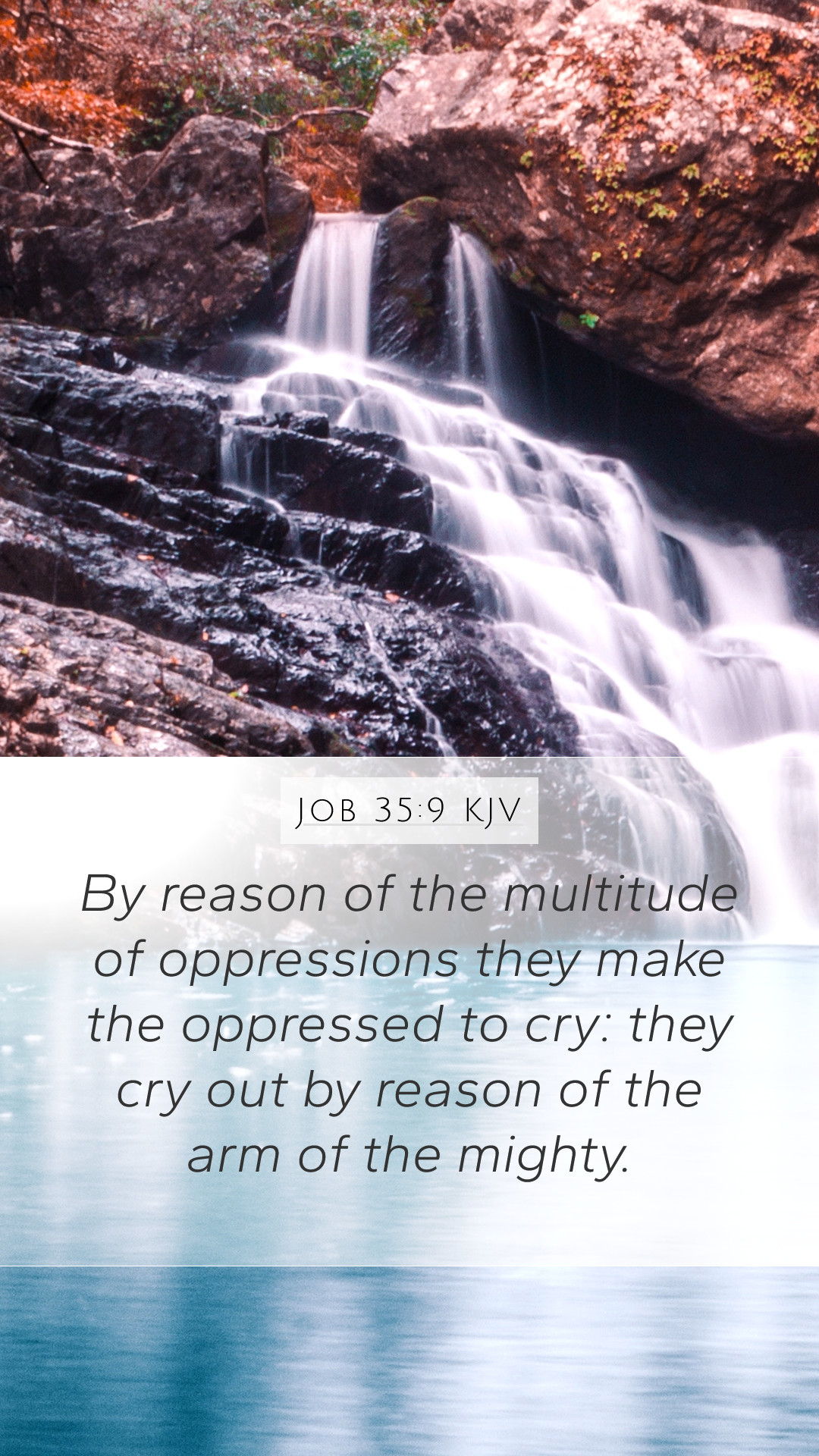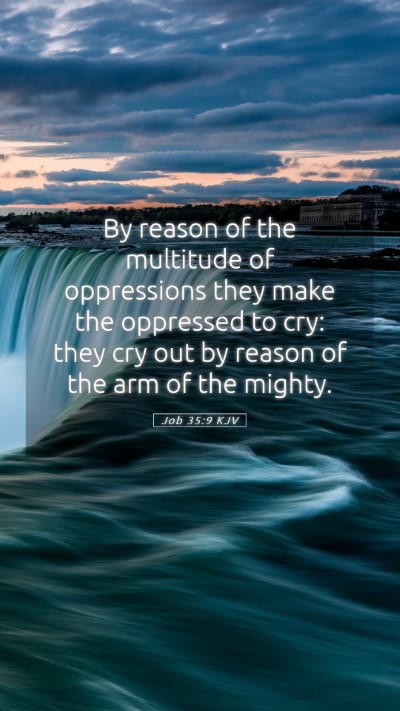Old Testament
Genesis Exodus Leviticus Numbers Deuteronomy Joshua Judges Ruth 1 Samuel 2 Samuel 1 Kings 2 Kings 1 Chronicles 2 Chronicles Ezra Nehemiah Esther Job Psalms Proverbs Ecclesiastes Song of Solomon Isaiah Jeremiah Lamentations Ezekiel Daniel Hosea Joel Amos Obadiah Jonah Micah Nahum Habakkuk Zephaniah Haggai Zechariah MalachiJob 35:9 Meaning
What is the meaning of Job 35:9?
By reason of the multitude of oppressions they make the oppressed to cry: they cry out by reason of the arm of the mighty.
Job 35:9 Bible Verse Meaning
Understanding Job 35:9 - A Combined Commentary
Job 35:9 states: "By reason of the multitude of oppressions they make the oppressed to cry: they cry out by reason of the arm of the mighty."
This verse reflects the profound suffering of the oppressed and their lamentation under the weight of oppression. It raises significant questions about the nature of suffering, justice, and divine oversight. Here we delve into the interpretations and meanings provided by esteemed public domain commentators such as Matthew Henry, Albert Barnes, and Adam Clarke.
Verse Context
Job is engaged in a dialogue about the justice of God, particularly focusing on the oppression faced by the righteous and innocent. In the immediate context, Job is addressing the reality of how the mighty often take advantage of their power, leaving the vulnerable and downtrodden crying for help.
Commentary Insights
-
Matthew Henry's Commentary:
Henry emphasizes that oppression leads to despair among the oppressed. He highlights that the cries of the oppressed reach the ears of God, suggesting that God is aware of their plight. This perspective fosters a sense of hope, as it reassures that even amidst suffering, divine justice is not absent.
-
Albert Barnes' Commentary:
Barnes points out that the oppressed often resort to crying out due to the overwhelming nature of their suffering. He implies that it's human tendency to be oblivious to the suffering of others unless it directly affects them. This insight encourages believers to be empathetic and active in alleviating the struggles of those around them.
-
Adam Clarke's Commentary:
Clarke notes that there is a moral message concerning the responsibility of individuals toward those who are in distress. He stresses the significance of recognizing oppression as a social injustice that requires collective conscience. Clarke's analysis invites reflection on how one’s actions can either contribute to or alleviate suffering.
Application to Daily Life
Job 35:9 encourages believers to reflect on how they engage with social justice issues. It calls for an understanding of the suffering of others, urging individuals to become advocates for the underprivileged. This verse also illuminates the importance of community, showing that collective efforts can address systemic oppression.
Biblical Exegesis
When interpreting this verse, it is essential to consider the themes of justice and mercy prominent in the Scriptures. As highlighted in various commentaries, the understanding of this scripture goes beyond mere acknowledgment of suffering; it extends into actions that contribute toward justice and advocacy for the oppressed.
Relevant Cross References
- Psalms 9:12: "When he maketh inquisition for blood, he remembereth them: he forgetteth not the cry of the humble."
- Isaiah 35:4: "Say to them that are of a fearful heart, Be strong, fear not: behold, your God will come with vengeance, even God with a recompence; he will come and save you."
- Proverbs 22:22-23: "Rob not the poor, because he is poor: neither oppress the afflicted in the gate: For the Lord will plead their cause, and spoil the soul of those that spoiled them."
Conclusion
In summary, Job 35:9 serves as a poignant reminder of both the reality of human suffering and the divine oversight that underpins it. By combining insights from Matthew Henry, Albert Barnes, and Adam Clarke, we gain a multilayered understanding of the verse, encouraging believers to engage in meaningful action towards social justice and support for the oppressed.
For individuals engaging in Bible study groups or seeking Bible study resources, this verse provides rich material for discussion around Bible verse meanings, Bible verse interpretations, and understanding Scripture. It highlights not only the challenges faced by the oppressed but also our collective responsibility to respond with compassion and advocacy.


